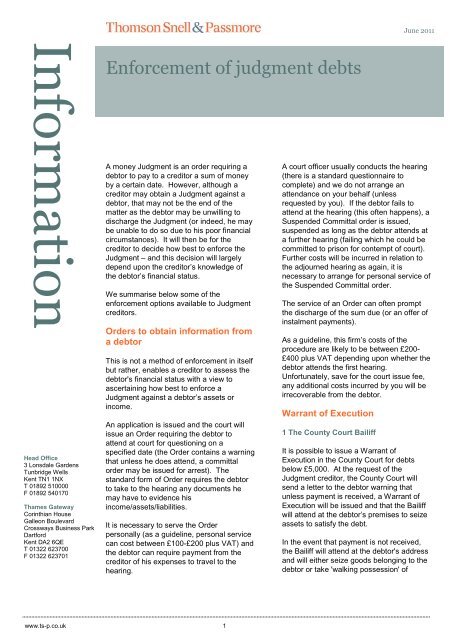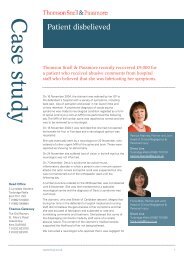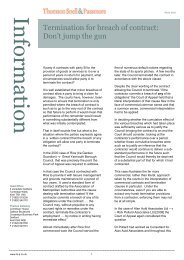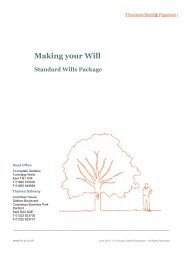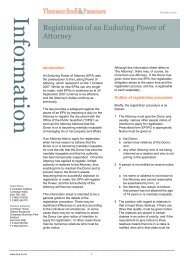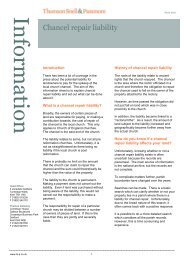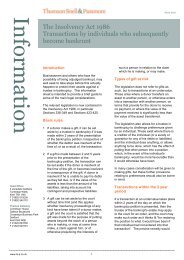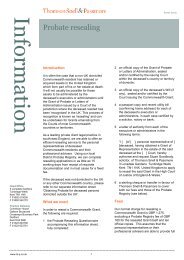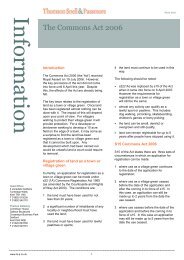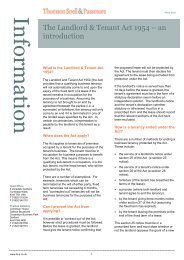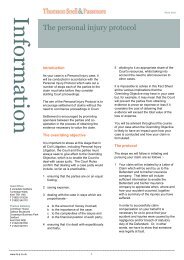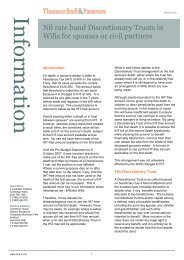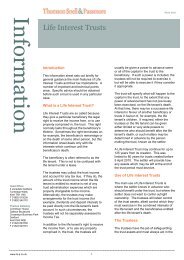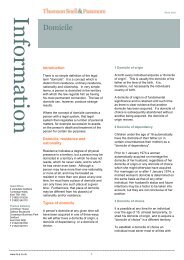Enforcement of judgment debts - Thomson Snell and Passmore
Enforcement of judgment debts - Thomson Snell and Passmore
Enforcement of judgment debts - Thomson Snell and Passmore
You also want an ePaper? Increase the reach of your titles
YUMPU automatically turns print PDFs into web optimized ePapers that Google loves.
Information<br />
June 2011<br />
<strong>Enforcement</strong> <strong>of</strong> <strong>judgment</strong> <strong>debts</strong><br />
Head Office<br />
3 Lonsdale Gardens<br />
Tunbridge Wells<br />
Kent TN1 1NX<br />
T 01892 510000<br />
F 01892 540170<br />
Thames Gateway<br />
Corinthian House<br />
Galleon Boulevard<br />
Crossways Business Park<br />
Dartford<br />
Kent DA2 6QE<br />
T 01322 623700<br />
F 01322 623701<br />
A money Judgment is an order requiring a<br />
debtor to pay to a creditor a sum <strong>of</strong> money<br />
by a certain date. However, although a<br />
creditor may obtain a Judgment against a<br />
debtor, that may not be the end <strong>of</strong> the<br />
matter as the debtor may be unwilling to<br />
discharge the Judgment (or indeed, he may<br />
be unable to do so due to his poor financial<br />
circumstances). It will then be for the<br />
creditor to decide how best to enforce the<br />
Judgment – <strong>and</strong> this decision will largely<br />
depend upon the creditor’s knowledge <strong>of</strong><br />
the debtor’s financial status.<br />
We summarise below some <strong>of</strong> the<br />
enforcement options available to Judgment<br />
creditors.<br />
Orders to obtain information from<br />
a debtor<br />
This is not a method <strong>of</strong> enforcement in itself<br />
but rather, enables a creditor to assess the<br />
debtor's financial status with a view to<br />
ascertaining how best to enforce a<br />
Judgment against a debtor’s assets or<br />
income.<br />
An application is issued <strong>and</strong> the court will<br />
issue an Order requiring the debtor to<br />
attend at court for questioning on a<br />
specified date (the Order contains a warning<br />
that unless he does attend, a committal<br />
order may be issued for arrest). The<br />
st<strong>and</strong>ard form <strong>of</strong> Order requires the debtor<br />
to take to the hearing any documents he<br />
may have to evidence his<br />
income/assets/liabilities.<br />
It is necessary to serve the Order<br />
personally (as a guideline, personal service<br />
can cost between £100-£200 plus VAT) <strong>and</strong><br />
the debtor can require payment from the<br />
creditor <strong>of</strong> his expenses to travel to the<br />
hearing.<br />
A court <strong>of</strong>ficer usually conducts the hearing<br />
(there is a st<strong>and</strong>ard questionnaire to<br />
complete) <strong>and</strong> we do not arrange an<br />
attendance on your behalf (unless<br />
requested by you). If the debtor fails to<br />
attend at the hearing (this <strong>of</strong>ten happens), a<br />
Suspended Committal order is issued,<br />
suspended as long as the debtor attends at<br />
a further hearing (failing which he could be<br />
committed to prison for contempt <strong>of</strong> court).<br />
Further costs will be incurred in relation to<br />
the adjourned hearing as again, it is<br />
necessary to arrange for personal service <strong>of</strong><br />
the Suspended Committal order.<br />
The service <strong>of</strong> an Order can <strong>of</strong>ten prompt<br />
the discharge <strong>of</strong> the sum due (or an <strong>of</strong>fer <strong>of</strong><br />
instalment payments).<br />
As a guideline, this firm’s costs <strong>of</strong> the<br />
procedure are likely to be between £200-<br />
£400 plus VAT depending upon whether the<br />
debtor attends the first hearing.<br />
Unfortunately, save for the court issue fee,<br />
any additional costs incurred by you will be<br />
irrecoverable from the debtor.<br />
Warrant <strong>of</strong> Execution<br />
1 The County Court Bailiff<br />
It is possible to issue a Warrant <strong>of</strong><br />
Execution in the County Court for <strong>debts</strong><br />
below £5,000. At the request <strong>of</strong> the<br />
Judgment creditor, the County Court will<br />
send a letter to the debtor warning that<br />
unless payment is received, a Warrant <strong>of</strong><br />
Execution will be issued <strong>and</strong> that the Bailiff<br />
will attend at the debtor’s premises to seize<br />
assets to satisfy the debt.<br />
In the event that payment is not received,<br />
the Bailiff will attend at the debtor's address<br />
<strong>and</strong> will either seize goods belonging to the<br />
debtor or take 'walking possession' <strong>of</strong><br />
www.ts-p.co.uk 1
June 2011<br />
<strong>Enforcement</strong> <strong>of</strong> <strong>judgment</strong> <strong>debts</strong> (continued)<br />
goods. Walking possession means that the<br />
Bailiff will agree that if he does not remove<br />
the goods then the debtor will not remove or<br />
otherwise deal with them. This then gives<br />
the debtor a short period <strong>of</strong> time within<br />
which to discharge the debt or reach an<br />
instalment arrangement with the Judgment<br />
creditor.<br />
As a guideline, this firm’s costs <strong>of</strong> the<br />
procedure are likely to be between £100-<br />
£150 plus VAT <strong>and</strong> in addition, the court fee<br />
payable is £50.00 (for Judgments in excess<br />
<strong>of</strong> £125). Unfortunately, save for the court<br />
issue fee, any additional costs incurred by<br />
you will be irrecoverable from the debtor.<br />
2 The Sheriff’s Office<br />
The High Court Sheriff is able to levy<br />
execution against Judgments in excess <strong>of</strong><br />
£600 by the issue <strong>of</strong> a Writ <strong>of</strong> Fieri Facias (a<br />
High Court Warrant <strong>of</strong> Execution). The<br />
procedure for the issue <strong>of</strong> a Warrant <strong>of</strong><br />
Execution can be dealt with either by this<br />
firm in person or by the Sheriffs Lodgement<br />
Centre who act as our agents in arranging<br />
for the transfer <strong>of</strong> the county court<br />
proceedings to the High Court (the latter<br />
can take longer but is more cost effective).<br />
The Sheriff will take a percentage <strong>of</strong> the<br />
sums recovered from the debtor but<br />
otherwise, the procedure is similar to the<br />
instruction <strong>of</strong> the County Court Bailiff.<br />
The difficulty with Warrants <strong>of</strong> Execution is<br />
that <strong>of</strong>ten a debtor is able to demonstrate<br />
that none <strong>of</strong> the goods located at the<br />
premises belong to him (eg because they<br />
are subject to a Lease or HP Agreement).<br />
In those circumstances, the Bailiff/Sheriff<br />
would be unable to take possession <strong>of</strong> the<br />
goods. Further, certain goods are exempt<br />
from seizure (such as tools, books <strong>and</strong><br />
other items <strong>of</strong> equipment required in<br />
connection with the debtor's business). A<br />
further difficulty is that the Bailiff/Sheriff is<br />
unable to force entry to a residential<br />
address.<br />
As a guideline, this firm’s costs <strong>of</strong> the<br />
procedure are likely to be between £200-<br />
£300 plus VAT <strong>and</strong> in addition, there will be<br />
fees payable to the Sheriffs Lodgement<br />
Centre (if that option is pursued). Again,<br />
save for the court issue fees, any additional<br />
costs will be irrecoverable from the debtor.<br />
3 Third Party Debt Orders<br />
Where a Judgment creditor is aware that<br />
the debtor is owed money by a third party<br />
(ie for instance, where the debtor’s bank<br />
account is in credit), then he may issue an<br />
application for a Third Party Debt Order<br />
requiring a third party to pay that sum to the<br />
creditor by way <strong>of</strong> full or partial payment <strong>of</strong><br />
the Judgment debt. Banks <strong>and</strong> Building<br />
Societies or other types <strong>of</strong> deposit taking<br />
institutions are ideal targets for this method<br />
<strong>of</strong> enforcement, as they are obliged to<br />
comply with the Order if the debtor’s<br />
account is in credit. However, the<br />
Judgment creditor will first need to have<br />
knowledge <strong>of</strong> the debtor’s bank or building<br />
society account(s).<br />
An application is made to the court <strong>and</strong><br />
generally speaking, an Interim Order will be<br />
granted on an ex-parte basis (ie without<br />
notice being given to the debtor) provided<br />
that sufficient evidence has been produced<br />
to demonstrate that the debt is due from the<br />
third party <strong>and</strong> it is properly attachable. The<br />
Interim Order will be served on the Third<br />
Party giving notice <strong>of</strong> a hearing when a<br />
Third Party Debt Order may be made<br />
seeking payment <strong>of</strong> the debt by the Third<br />
Party to the creditor. At the hearing, the<br />
www.ts-p.co.uk 2
June 2011<br />
<strong>Enforcement</strong> <strong>of</strong> <strong>judgment</strong> <strong>debts</strong> (continued)<br />
Third Party <strong>and</strong> the debtor may make<br />
representations opposing the grant <strong>of</strong> a final<br />
Order.<br />
The Third Party is able to deduct his costs<br />
from the debt before payment. Only fixed<br />
costs are allowable to the Judgment creditor<br />
on the application which means that any<br />
legal costs incurred over <strong>and</strong> above those<br />
fixed costs will be payable by the Judgment<br />
creditor himself.<br />
This procedure can be rather more costly<br />
than 1 or 2 above as usually a hearing will<br />
be listed <strong>and</strong> we would therefore be<br />
required to attend at court on your behalf.<br />
As a guideline, the firm’s costs <strong>of</strong> the<br />
procedure are likely to be between £400-<br />
£500 plus VAT plus the court issue fee <strong>of</strong><br />
£50.<br />
4 Attachment <strong>of</strong> Earnings<br />
This procedure is suitable only where the<br />
debtor is employed. An application is made<br />
for an order compelling the debtor’s<br />
employer to make regular deductions from<br />
the debtor’s earnings <strong>and</strong> to pay them into<br />
court. The application will be served on the<br />
debtor together with a questionnaire which<br />
the debtor must complete providing a<br />
statement <strong>of</strong> his means. At any stage <strong>of</strong> the<br />
proceedings, the court may also require<br />
information as to earnings from the debtor’s<br />
employer.<br />
If the debtor completes <strong>and</strong> returns the<br />
statement <strong>of</strong> means, the court staff may<br />
assess the debtor’s finances <strong>and</strong> make an<br />
attachment <strong>of</strong> earnings order. Copies <strong>of</strong> the<br />
Order are then served on the debtor’s<br />
employers. No hearing will be convened<br />
unless the court staff consider they lack<br />
sufficient information to make an order or<br />
the debtor objects to an order being made.<br />
Should the debtor fail to complete the<br />
statement <strong>of</strong> means, the court staff will<br />
automatically issue an order compelling him<br />
to do so. The order will be endorsed with a<br />
warning that a Committal Order may be<br />
issued in the event <strong>of</strong> his failure to do so<br />
<strong>and</strong> it will be served on the debtor<br />
personally.<br />
The court may order a hearing to seek<br />
further information from the debtor.<br />
The final attachment <strong>of</strong> earnings order may<br />
specify an amount which the court decides<br />
the debtor may keep from his earnings -<br />
thus, if the debtor indicates a high outgoings<br />
figure, there may be little left to ‘attach’ <strong>and</strong><br />
the net result may be for example, that the<br />
employer is only ordered to pay as little as<br />
£10/£20 per month from the debtor’s net<br />
earnings.<br />
Again, this procedure can be rather more<br />
costly than 1 or 2 above as a hearing may<br />
be listed <strong>and</strong> we would therefore be<br />
required to attend at court on your behalf.<br />
As a guideline, the firm’s costs <strong>of</strong> the<br />
procedure are likely to be between £200-<br />
£500 plus VAT plus the court issue fee <strong>of</strong><br />
£50. Unfortunately, save for the court issue<br />
fee <strong>and</strong> a certain amount <strong>of</strong> fixed costs, any<br />
legal costs incurred by you will be<br />
irrecoverable from the debtor.<br />
5 Charging Orders<br />
Where a debtor has an interest in property<br />
(whether l<strong>and</strong> or securities), it is possible to<br />
obtain a Charging Order against that<br />
interest. However, whilst the Charging<br />
Order may provide some security for the<br />
Judgment debt, it will not discharge the<br />
Judgment debt by itself (as to do so will<br />
require an Order for Sale <strong>of</strong> the Property).<br />
We would be happy to advise in relation to<br />
www.ts-p.co.uk 3
June 2011<br />
<strong>Enforcement</strong> <strong>of</strong> <strong>judgment</strong> <strong>debts</strong> (continued)<br />
the procedure <strong>and</strong> costs involved in an<br />
application for a Charging Order.<br />
6 Bankruptcy/Liquidation<br />
For an outst<strong>and</strong>ing Judgment in excess <strong>of</strong><br />
£750 the Judgment Creditor may serve a<br />
Statutory Dem<strong>and</strong> <strong>and</strong> subsequently issue a<br />
Bankruptcy Petition (against an individual)<br />
or a Winding-Up Petition (against a<br />
company). There is a risk in embarking<br />
upon this procedure as the debtor may be<br />
insolvent <strong>and</strong> the Judgment creditor may<br />
therefore see no recovery against the costs<br />
<strong>of</strong> the Petition.<br />
Again, we would be happy to advise in<br />
relation to the procedure <strong>and</strong> costs involved<br />
in the issue <strong>of</strong> Bankruptcy <strong>and</strong> Winding Up<br />
Petitions.<br />
‘guideline’ figures for those costs that are<br />
likely to be incurred in relation to each<br />
enforcement method, as our fees will<br />
depend upon the amount <strong>of</strong> time spent by<br />
us, the level <strong>of</strong> our fees will vary in every<br />
case.<br />
This information sheet has been prepared to<br />
highlight some key issues relating to<br />
<strong>Enforcement</strong> Options. It is intended to be<br />
for general guidance only <strong>and</strong> is not a<br />
substitute for specific advice. It is based<br />
upon our underst<strong>and</strong>ing <strong>of</strong> the legal position<br />
as at June 2004 <strong>and</strong> may be affected by<br />
subsequent changes in the law. Should you<br />
require any specific legal advice on the<br />
issues covered, please contact Julie Gabay<br />
on 01892 510000 or by email at:<br />
julie.gabay@ts-p.co.uk<br />
7 Costs : Generally<br />
Unfortunately, it is always difficult to<br />
estimate with any certainty the level <strong>of</strong> fees<br />
to be incurred in a litigation matter at the<br />
outset. Although we have provided some<br />
© <strong>Thomson</strong> <strong>Snell</strong> & <strong>Passmore</strong> LLP All Rights Reserved<br />
www.ts-p.co.uk 4


